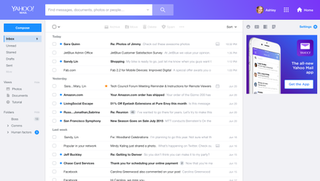
Phishing is a form of social engineering and a scam where attackers deceive people into revealing sensitive information or installing malware such as viruses, worms, adware, or ransomware. Phishing attacks have become increasingly sophisticated and often transparently mirror the site being targeted, allowing the attacker to observe everything while the victim navigates the site, and transverses any additional security boundaries with the victim. As of 2020, it is the most common type of cybercrime, with the FBI's Internet Crime Complaint Center reporting more incidents of phishing than any other type of computer crime.

Yahoo! Mail is an email service offered by the American company Yahoo, Inc. The service is free for personal use, with an optional monthly fee for additional features. Business email was previously available with the Yahoo! Small Business brand, before it transitioned to Verizon Small Business Essentials in early 2022. Launched on October 8, 1997, as of January 2020, Yahoo! Mail has 225 million users.
The following tables compare general and technical information for a number of notable webmail providers who offer a web interface in English.
Yahoo Voice was a Voice over Internet Protocol (VoIP), PC-PC, PC-Phone and Phone-to-PC telecommunications service. It was provided by Yahoo via its Yahoo Messenger instant messaging application.
LastPass is a password manager application. The standard version of LastPass comes with a web interface, but also includes plugins for various web browsers and apps for many smartphones. It also includes support for bookmarklets.
RockYou was a company that developed widgets for MySpace and implemented applications for various social networks and Facebook. Since 2014, it has engaged primarily in the purchases of rights to classic video games; it incorporates in-game ads and re-distributes the games.
EmailTray is a lightweight email client for the Microsoft Windows operating system. EmailTray was developed by Internet Promotion Agency S.A., a software development d.
The 2012 LinkedIn hack refers to the computer hacking of LinkedIn on June 5, 2012. Passwords for nearly 6.5 million user accounts were stolen. Yevgeniy Nikulin was convicted of the crime and sentenced to 88 months in prison.
Marcel Lehel Lazăr, known as Guccifer, is a Romanian hacker responsible for high-level computer security breaches in the U.S. and Romania. Lazăr targeted celebrities, Romanian and U.S. government officials, and other prominent persons.
In July 2015, an unknown person or group calling itself "The Impact Team" announced they had stolen the user data of Ashley Madison, a commercial website billed as enabling extramarital affairs. The hacker(s) copied personal information about the site's user base and threatened to release users' names and personal identifying information if Ashley Madison would not immediately shut down. As evidence of the seriousness of the threat, the personal information of more than 2,500 users was initially released. The company initially denied that its records were insecure, but it continued to operate.

Have I Been Pwned? is a website that allows Internet users to check whether their personal data has been compromised by data breaches. The service collects and analyzes hundreds of database dumps and pastes containing information about billions of leaked accounts, and allows users to search for their own information by entering their username or email address. Users can also sign up to be notified if their email address appears in future dumps. The site has been widely touted as a valuable resource for Internet users wishing to protect their own security and privacy. Have I Been Pwned? was created by security expert Troy Hunt on 4 December 2013.
Alex Holden is the owner of Hold Security, a computer security firm. As of 2015, the firm employs 16 people.
Credential stuffing is a type of cyberattack in which the attacker collects stolen account credentials, typically consisting of lists of usernames or email addresses and the corresponding passwords, and then uses the credentials to gain unauthorized access to user accounts on other systems through large-scale automated login requests directed against a web application. Unlike credential cracking, credential stuffing attacks do not attempt to use brute force or guess any passwords – the attacker simply automates the logins for a large number of previously discovered credential pairs using standard web automation tools such as Selenium, cURL, PhantomJS or tools designed specifically for these types of attacks, such as Sentry MBA, SNIPR, STORM, Blackbullet and Openbullet.
In 2013 and 2014, the American web services company Yahoo was subjected to two of the largest data breaches on record. Although Yahoo was aware, neither breach was revealed publicly until September 2016.
Yandex Mail is a Russian free email service developed by Yandex. It was launched on 26 June 2000, and is one of the three largest email services in Runet. The service uses automatic spam filtering, checks for viruses using antivirus software from Dr.Web, and an email translator.
ShinyHunters is a black-hat criminal hacker group that is believed to have formed in 2020 and is said to have been involved in numerous data breaches. The stolen information is often sold on the dark web.

The Epik data breach occurred in September and October 2021, targeting the American domain registrar and web hosting company Epik. The breach exposed a wide range of information including personal information of customers, domain history and purchase records, credit card information, internal company emails, and records from the company's WHOIS privacy service. More than 15 million unique email addresses were exposed, belonging to customers and to non-customers whose information had been scraped. The attackers responsible for the breach identified themselves as members of the hacktivist collective Anonymous. The attackers released an initial 180 gigabyte dataset on September 13, 2021, though the data appeared to have been exfiltrated in late February of the same year. A second release, this time containing bootable disk images, was made on September 29. A third release on October 4 reportedly contained more bootable disk images and documents belonging to the Texas Republican Party, a customer of Epik's.



